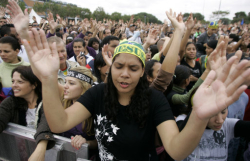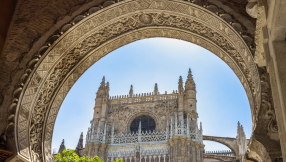Latin Americans are increasingly shifting their religious allegiance from Roman Catholicism to evangelical Protestantism – and it's because they want a personal relationship with God.

A major Pew Forum study into religious affiliations, beliefs and practices in 18 countries and the US territory of Puerto Rico has found that only 69 per cent of Latin Americans now identify as Catholic, down from at least 90 per cent in the 1960s. In nearly every country surveyed, the Catholic Church has experienced net losses from members joining evangelical Protestant churches or rejecting organised religion altogether.
Overall, 84 per cent of Latin American adults say they were raised Catholic, 15 per cent more than those who say they are currently Catholic. However, while only nine per cent say they were raised Protestant, 19 per cent say they are now Protestant.
The survey asked former Catholics who have converted to Protestantism why they did so. Of the eight possible explanations offered, the most frequently cited was that they were seeking a more personal connection with God.
Many converts also said they wanted a different style of worship or a church that helps its members more.
Other factors included health, family problems or marriage to a non-Catholic.
Evangelisation efforts by Protestant churches are also effective. More than half of those who have switched say their new church reached out to them. The survey found that Protestants in the region were much more likely than Catholics to report sharing their faith with people outside their own religious group.
Most converts say that they left Catholicism before the age of 25. Geographic mobility may also be a factor, with converts often likely to have changed their place of residence.
Another factor may be the relative conservatism of Latin American Protestantism. On average, Catholics are less opposed to abortion, homosexuality, contraception, sex outside marriage, divorce and alchohol than Protestants. According to Pew, "These differing views on social issues may help explain why many former Catholics who have become Protestants say they were looking for a church that 'places greater importance on living a moral life'."
Pentecostal forms of Protestantism, whose services feature divine healing, speaking in tongues and receiving direct revelations from God, are particularly popular in Latin America. Nearly two-thirds of Protestants identify as Pentecostal either by denomination or personal conviction.
The 'Pope Francis factor' – the boost to Catholicism from the Pope's personal popularity – is far more marked among current Catholics than among converts. The survey found that people who are currently Catholic overwhelmingly view Francis favourably and consider his papacy a major change for the Church. However, former Catholics are more sceptical. In Argentina and Uruguay most ex-Catholics express a favorable view of him, but in every other country no more than roughly half of ex-Catholics view Francis favorably and relatively few see his papacy as a significant change.














